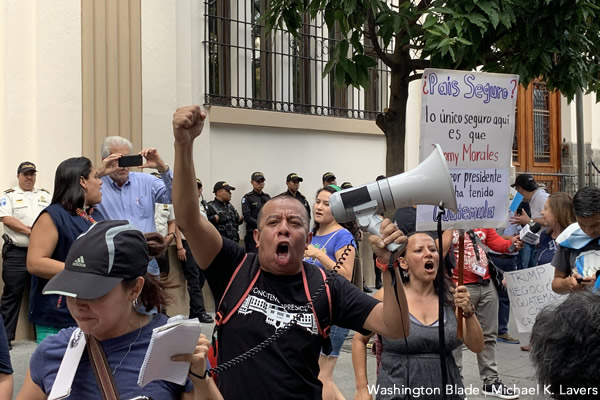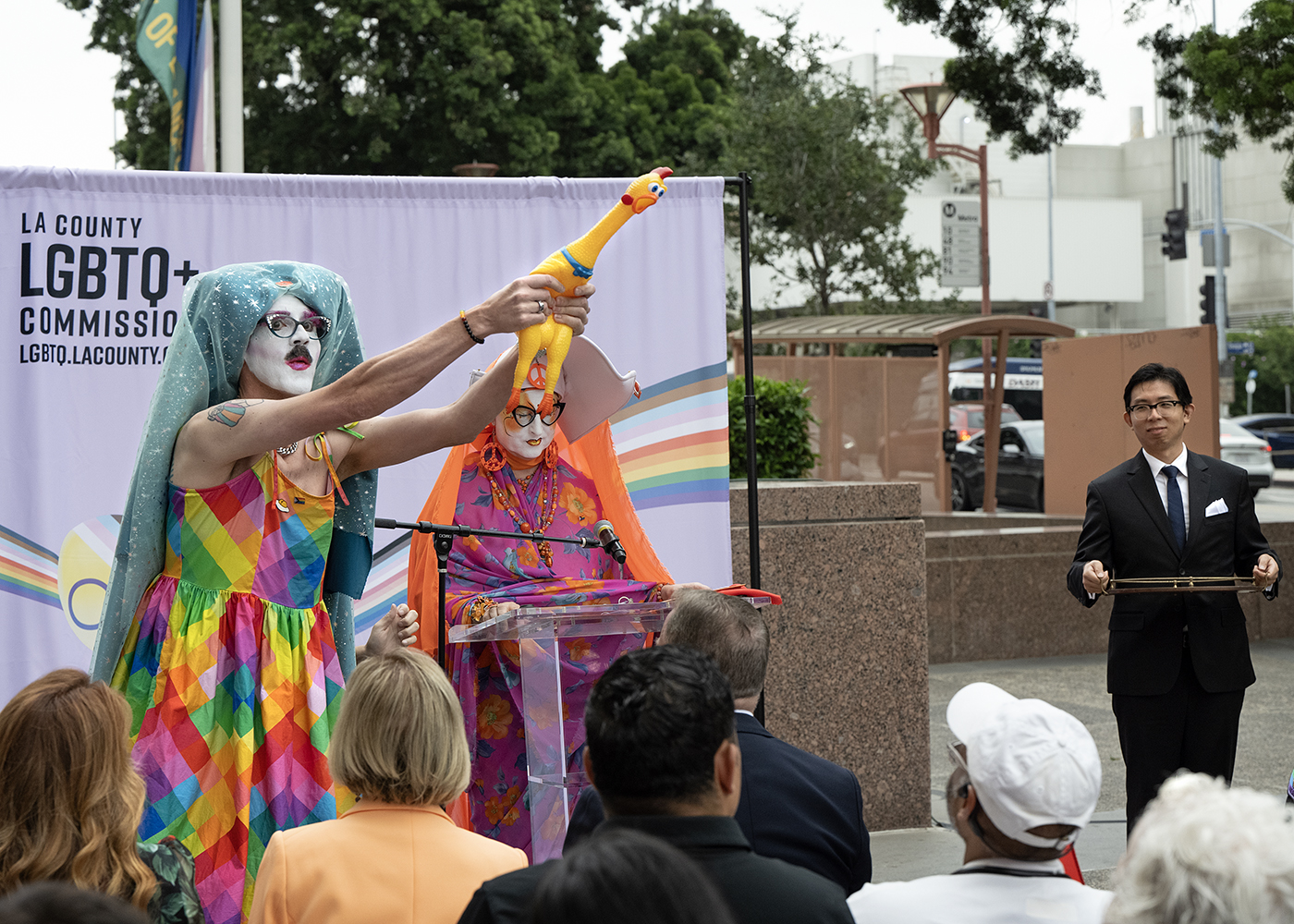Politics
Victory Institute to honor Maine House speaker, Guatemala congressman
Ryan Fecteau and Aldo Dávila praised for leadership

WASHINGTON — The LGBTQ Victory Institute will honor Maine House Speaker Ryan Fecteau and Guatemalan Congressman Aldo Dávila at a conference that will take place in D.C. next month.
Fecteau, who is the first out speaker of the Maine House of Representatives, will receive the Tammy Baldwin Breakthrough Award. Dávila, the first openly gay man and the first person with HIV elected to the Guatemalan Congress, will receive the 2021 Global Trailblazer Award.
The Victory Institute will honor Dávila and Fecteau at it’s International LGBTQ Leaders Conference that will take place in-person in D.C. and remotely from Dec. 1-4.
“It’s been an honor of a lifetime to serve as speaker of the Maine House,” tweeted Fecteau on Monday after the Victory Institute announced it will honor him and Dávila.
1/2 Thanks to your support & votes I’m @VictoryInst‘s 2021 @TammyBaldwin Breakthrough Award recipient!
It’s been an honor of a lifetime to serve as Speaker of the Maine House. Also huge congrats to @aldodavila_gt, 2021 Global Trailblazer recipient. pic.twitter.com/eTJiVcFvMJ
— Ryan Fecteau 🏳️🌈 (@SpeakerFecteau) November 8, 2021
Three men earlier this year tried to rob Dávila when they approached his car near Guatemala’s National Library. One of his bodyguards shot one of the would-be assailants.
Dávila in September told the Los Angeles Blade during an interview in Guatemala City that he has received death threats because he continues to speak out against corruption in the country. Supporters of Guatemalan President Alejandro Giammattei have also filed nearly a dozen formal complaints against him.
“I am scared of what may happen with so much persecution against me,” Dávila told the Blade. “I am scared for my life, for my partner, for my family and for my team.”
Victory Institute Executive Director Ruben Gonzales in a statement described Dávila as “a proud out leader who continues to advocate for LGBTQ people despite death threats and intimidation from his own government.” Gonzales said Fecteau is “a role model who shows (LGBTQ youth) their future is bright.”
Congress
White House finds Calif. violated Title IX by allowing trans athletes in school sports
Education Department threatens ‘imminent enforcement action’

The Trump-Vance administration announced on Wednesday that California’s Interscholastic Federation and Department of Education violated federal Title IX rules for allowing transgender girls to compete in school sports.
In a press release, the U.S. Department of Education’s Office of Civil Rights threatened “imminent enforcement action” including “referral to the U.S. Department of Justice” and the withholding of federal education funding for the state if the parties do not “agree to change these unlawful practices within 10 days.”
The agency specified that to come into compliance; California must enforce a ban excluding transgender student athletes and reclaim any titles, records, and awards they had won.
Federal investigations of the California Interscholastic Federation and the state’s Department of Education were begun in February and April, respectively. The Justice Department sued Maine in April for allowing trans athletes to compete and refusing a similar proposal to certify compliance within 10 days.
Broadly, the Trump-Vance administration’s position is that girls who are made to compete against trans opponents or alongside trans teammates are unfairly disadvantaged, robbed of opportunities like athletics scholarships, and faced with increased risk of injury — constituting actionable claims of unlawful sex discrimination under Title IX.
This marks a major departure from how the previous administration enforced the law. For example, the Department of Education issued new Title IX guidelines in April 2024 that instructed schools and educational institutions covered by the statute to not enforce categorical bans against trans athletes, instead allowing for limited restrictions on eligibility if necessary to ensure fairness or safety at the high school or college level.
Sports aside, under former President Joe Biden the department’s Office of Civil Rights sought to protect against anti-LGBTQ+ discrimination in education, bringing investigations and enforcement actions in cases where school officials might, for example, require trans students to use restrooms and facilities consistent with their birth sex or fail to respond to peer harassment over their gender identity.
Much of the legal reasoning behind the Biden-Harris administration’s positions extended from the 2020 U.S. Supreme Court case Bostock v. Clayton County, which found that sex-based discrimination includes that which is based on sexual orientation or gender identity under Title VII rules covering employment practices.
A number of high profile Democrats, including California Gov. Gavin Newsom, have recently questioned or challenged the party’s position on transgender athletes, as noted in a statement by Education Secretary Linda McMahon included in Wednesday’s announcement.
“Although Gov. Gavin Newsom admitted months ago it was ‘deeply unfair’ to allow men to compete in women’s sports, both the California Department of Education and the California Interscholastic Federation continued as recently as a few weeks ago to allow men to steal female athletes’ well-deserved accolades and to subject them to the indignity of unfair and unsafe competitions.”
Congress
Garcia elected top Democrat on the House Oversight Committee
Gay Calif. lawmaker vows to hold Trump-Vance administration accountable

U.S. Rep. Robert Garcia (D-Calif.) on Tuesday was elected top Democrat on the House Oversight Committee in a vote that signaled the conference’s overwhelming support for a newer voice on Capitol Hill who will play a key role taking on President Donald Trump.
With a margin of 150-63, the 47-year-old openly gay congressman defeated U.S. Rep. Stephen Lynch (D-Mass.), alongside U.S. Reps. Jasmine Crockett (D-Texas) and Kweisi Mfume (D-Md.) who exited the race after the House Democratic Steering and Policy Committee backed Garcia.
Serving only since 2023, the congressman has had a remarkably quick ascent leading up to his election this week as ranking member of one of the most powerful House committees, awarded a leadership position serving under House Democratic Whip Katherine Clark (Mass.) and selected as a co-chair of former Vice President Kamala Harris’s 2024 presidential campaign.
Democratic members began jockeying for the top seat on the oversight committee this spring after the late-U.S. Rep. Gerry Connolly of Virginia stepped away amid news that his esophageal cancer had returned. He died in May.
Connolly last year fended off a challenge from one of the most well known House Democrats, U.S. Rep. Alexandria Ocasio-Cortez (N.Y.), though with a narrower margin that signaled intra-party tensions over whether leadership roles should still be awarded based on seniority.
Garcia positioned himself as a bridge between the two camps — a consensus candidate with executive managerial experience as the former mayor of Long Beach. At the same time, particularly since the start of Trump’s second term, the congressman has emerged as one of the most outspoken critics of the new Republican regime.
In a statement on X Tuesday, Garcia thanked his colleagues and promised to “hold Donald Trump and his administration accountable.”
I'm honored to have been elected by @HouseDemocrats to serve as Ranking Member on @OversightDems.
— Congressman Robert Garcia (@RepRobertGarcia) June 24, 2025
We will hold Donald Trump and his Administration accountable for their corruption – and work to make our government more effective for the American people.
Let's get to work.
If Democrats win control of the House next year, the oversight committee will be able to exercise powers that are now available only to Republicans under the chair, U.S. Rep. James Comer (R-Ky.), which include the authority to investigate virtually any matter across the federal government, to issue subpoenas, and to compel testimony.
In the meantime, Garcia on Monday promised that Democrats on the committee would “vigorously fight” Republican Speaker Mike Johnson’s (La.) plans “to dismantle the Government Accountability Office.”
Congress
Padilla forcibly removed from federal building for questioning DHS secretary
Prominent Democrats rushed to defend senator

Democratic U.S. Sen. Alex Padilla of California was forcibly removed from a federal building in Los Angeles after attempting to ask questions of U.S. Homeland Security Secretary Kristi Noem during a press conference on immigration Thursday
The city has been rattled in recent days as protestors objecting to the Trump-Vance administration’s immigration crackdowns clashed with law enforcement and then the president deployed National Guard troops and U.S. Marines, which was seen as a dramatic escalation.
According to a video shared by his office, the senator, who serves as ranking member of the Senate Judiciary Immigration Subcommittee, introduced himself and said, I have questions for the secretary.” After he was pushed out of the room, officers with FBI-identifying vests told Padilla to put his hands behind his back and handcuffed him.
“Senator Padilla is currently in Los Angeles exercising his duty to perform Congressional oversight of the federal government’s operations in Los Angeles and across California,” reads a statement from his office.
“He was in the federal building to receive a briefing with General Guillot and was listening to Secretary Noem’s press conference,” the statement continued. “He tried to ask the secretary a question, and was forcibly removed by federal agents, forced to the ground and handcuffed. He is not currently detained, and we are working to get additional information.”
Democrats were furious, with many releasing strong statements online condemning the actions of law enforcement officers, including California Gov. Gavin Newsom (D), Los Angeles Mayor Karen Bass (D), and the state’s other U.S. senator, Adam Schiff (D).
Human Rights Campaign Chief of Staff Jay Brown also issued a statement: “A sitting U.S. senator should be allowed to ask a Cabinet secretary a question at a press conference — in his own state, on an issue affecting his constituents — without being violently thrown to the floor and handcuffed. Everyone who cares about our country must condemn this undemocratic act. Full stop.”
Congress
51 lawmakers sign letter to Rubio about Andry Hernández Romero
U.S. Rep. Robert Garcia (D-Calif.) spoke about gay Venezuelan asylum seeker

Forty nine members of Congress and two U.S. senators, all Democrats, signed a letter Monday to Secretary of State Marco Rubio demanding information about Andry Hernández Romero, a gay Venezuelan national who was deported to El Salvador and imprisoned in the country’s notorious Terrorism Confinement Center, a maximum-security prison known by the Spanish acronym CECOT
“We are deeply concerned about the health and wellbeing of Mr. Hernández Romero, who left Venezuela after experiencing discriminatory treatment because of his sexual orientation and opposition to Venezuela’s authoritarian government,” the lawmakers wrote. They urged the State Department to facilitate his access to legal counsel and take steps to return him.
After passing a credible fear interview and while awaiting a court hearing in March, agents with U.S. Immigration and Customs Enforcement reportedly transported Hernández out of the U.S. without due process or providing evidence that he had committed any crime.
In the months since, pressure has been mounting. This past WorldPride weekend in Washington was kicked off with a rally in front of the U.S. Supreme Court and a fundraiser, both supporting Hernández and attended by high profile figures including members of Congress, like U.S. Rep. Mark Takano (D-Calif.)
U.S. Rep. Robert Garcia (D-Calif.) was among the four members who wrote to Rubio about Hernández in April. On Friday, he spoke with the Los Angeles Blade before he and his colleagues, many more of them this time, sent the second letter to Rubio.
“There’s a lot of obviously horrible things that are happening with the asylum process and visas and international students and just the whole of our value system as it relates to immigration,” he said, which “obviously, is under attack.”
“Andry’s case, I think, is very unique and different,” the congressman continued. “There is, right now, public support that is building. I think he has captured people’s attention. And it’s growing — this is a movement that is not slowing down. He’s going to be a focal point for Pride this year. I mean, I think people around the world are interested in the story.”
Garcia said he hopes the momentum will translate to progress on requests for proof of life, adding that he was optimistic after meeting with Hernández’s legal team earlier on Friday.
“I mean, the president, Kristi Noem, Marco Rubio — any of these folks could could ask to see if just he’s alive,” the congressman said, referring to the secretary of Homeland Security, whom he grilled during a hearing last month. ICE is housed under the DHS.
“People need to remember, the most important part of this that people need to remember, this isn’t just an immigration issue,” Garcia noted. “This is a due process issue. This is an asylum case. We gave him this appointment. The United States government told him to come to his appointment, and then we sent him to another country, not his own, and locked him up with no due process. That’s the issue.”
Garcia said that so far neither he nor his colleagues nor Hernández’s legal team were able to get “any answers from the administration, which is why we’re continuing to advocate, which is why we’re continuing to reach out to Secretary Rubio.”
“A lot more Democrats are now engaged on this issue,” he said. U.S. Sens. Adam Schiff and Alex Padilla, both from California, joined Monday’s letter. “The more that we can get folks to understand how critical this is, the better. The momentum matters here. And I think Pride does provide an opportunity to share his story.”
Asked what the next steps might be, Garcia said “we’re letting his legal team really take the lead on strategy,” noting that Hernández’s attorneys have “already engaged with the ACLU” and adding, “It’s very possible that the Supreme Court could take this on.”
In the meantime, the congressman said “part of our job is to make sure that that people don’t forget Andry and that there is awareness about him, and I think there’s a responsibility, particularly during WorldPride, and during Pride, all throughout the month — like, this is a story that people should know. People should know his name and and people should be aware of what’s going on.”
Breaking News
Controversy brews in the City of Glendale over support of Pride event
Republican Mayor Ara Najarian pushes back on funding family-friendly Pride event

Over the last three weeks, glendaleOUT — a local LGBTQ group based in Glendale, California and city leadership have been at odds over securing financial support of a family-friendly Pride event set to happen on Saturday, June 7. As of Tuesday, Glendale’s city council voted 3-2 in favor of funding the event, ending a weeks-long argument over securing the funds.
The controversy began when the group highlighted how neighboring cities have visibly demonstrated support for Pride Month celebrations across the county, while the City of Glendale has yet to sponsor events with banners, city logos and financial sponsorship.
Councilmember Dan Brotman proposed $5,000 in sponsorship funds, noting that the city has funded other cultural events with much larger amounts.
Local leaders, but specifically Mayor Ara Najarian — who was just re-elected for a fifth term — are pushing back and opposing the proposal for funding. According to sources, Mayor Najarian openly opposed the proposal, stating a distant conflict of interest as the reason for the opposition.
LGBTQ advocates have been quoted as saying this is a “bad-faith political tactic, not grounded in any real conflict of interest.”
The next potential vote is expected to happen today at a city council meeting. Organizers say that the Pride event will happen regardless, but that they still hope to shed light on the patterns of sexual orientation-based discrimination in the city council.
For more information about the free community Pride event, visit glendaleOUT’s website.
California
LA County officially kicks off Pride Month with blessing from The Sisters of Perpetual Indulgence
‘This needs to be done, because once again, our county and our nation houses people who want us gone, who wish us harm’

The LA County Board of Supervisors and the LA County LGBTQ+ Committee gathered on Tuesday, June 3, to officially kick off Pride Month across the county with a blessing from The Sisters of Perpetual Indulgence, who purified the space with their sacred chicken, then led everyone in blessing the Progress Pride flag before raising it at the Kenneth Hall of Administration.
“By raising this flag, the emblem of our souls and of our souls, of our love, of our survival, and of the gifts we offer to every Angeleno in this county — you all declare and you declare to everyone both here and abroad, that we are your people and you affirm that this is our home too,” said Sister Unity. “This needs to be done, because once again, our county and our nation houses people who want us gone, who wish us harm.”

LA County Supervisors and other community leaders gathered on Tuesday at the Kenneth Hall of Administration to raise the Progress Pride flag in honor of Pride Month. (Photo credit to Diandra Jay)
Supervisors Janice Hanh, Holly J. Mitchell, Lindsey P. Hovarth and Hilda L. Solis spoke on the importance of representation in the face of discrimination, homophobia and transphobia.
Supervisor Hahn mentioned in her speech that her father, Kenneth Frederick Hahn designed the LA County flag and it was clear to her that he believed that a flag was more than just a piece of fabric.
“My dad, the original Supervisor Hanh, designed the LA County flag and he understood that a flag is not just fabric. A flag is a symbol. It’s a visual representation of who we are, what we value and what we stand for.”
Two years ago, Supervisor Hahn started the tradition to raise the flag alongside the one her father designed and then it was Supervisor Horvath who suggested that the Pride flag be flown on all county facilities across Los Angeles.
“Now, in every corner of our vast county — from our lifeguard stations on our beaches, to every library, fire station — and may I add: all eight county buildings in the city of Downey. Wherever there is a county facility, the Progress Pride flag will send a clear, powerful message to our LGBTQ residents: ‘your county government unequivocally and unapologetically has your back.’”
The comment about the city of Downey is in regards to a controversial Pride flag ban that was enacted last year.
Supervisor Hahn then introduced LA County Assessor Jeff Prang, one of the longest-serving, out, elected officials in the state of California. Due to his long history in government and as a member of the LGBTQ community, Assessor Prang helped launch the LA County LGBTQ Elected Officials Association with over 50 active members from all levels of government.
“We are in a moment of crisis in the nation. Across the country, an extremist movement is working to dismantle LGBTQ rights — from banning books to criminalizing gender-affirming care, to silencing drag performers, to targeting our youth and families with cruelty disguised as policy,” said Assessor Prang. “These are not isolated incidents, this is a campaign of fear and repression.”
Héctor Trinidad-Plascencia, the Chair of LGBTQ+ Commission, encouraged attendees who are not from the queer and trans communities, to remove the blockages that keep them from being in solidarity with queer and trans people.
“With your solidarity, we are creating a different world together starting in our county home and for the nation to follow,” they said.
White House
DOJ launches investigation into Calif. trans student-athlete policy
State AG vows to defend Golden State laws

One day after President Donald Trump threatened to strip California of “large scale federal funding” over its policy on transgender student-athletes, his Justice Department announced it is investigating the state for potentially violating Title IX.
“The investigation is to determine whether California, its senior legal, educational, and athletic organizations, and the school district are engaging in a pattern or practice of discrimination on the basis of sex,” the DOJ said in a statement.
The DOJ said it notified State Attorney General Rob Bonta, State Superintendent of Public Instruction Tony Thurmond, the Jurupa Unified School District, and the California Interscholastic Federation of its investigation.
AB Hernandez, 16, is an out trans female student-athlete at Jurupa Valley High School who qualified for this weekend’s state track and field championship. As the Los Angeles Blade reported earlier this week, the CIF announced a change in the rules at the finals to accommodate girls who were displaced by Hernandez, including giving medals to cisgender competitors who earn a podium spot should Hernandez place ahead of them.
“We remain committed to defending and upholding California laws and all additional laws which ensure the rights of students, including transgender students, to be free from discrimination and harassment,” said Bonta in a statement. “We will continue to closely monitor the Trump administration’s actions in this space.”
As KTLA reported, California is one of 22 states that allow trans student-athletes to participate in sports consistent with their gender identity. Former Gov. Jerry Brown signed that policy into law in 2013.
The DOJ announced it is also now supporting a federal lawsuit targeting Bonta and the state Department of Education, claiming that California law and CIF policy discriminate against cisgender girls by allowing trans female athletes to compete according to their gender identity.
The lawsuit was filed by a conservative law group, Advocates for Faith and Freedom, representing the families of two girls at Martin Luther King High School in Riverside. Their suit claims the school’s cross-country team dropped one athlete from her varsity spot in favor of a trans athlete and that school administrators compared their “Save Girls Sports” T-shirts to swastikas.
Officials in Washington also weighed-in, referring to trans girls and women as “males.”
“Title IX exists to protect women and girls in education,” said Assistant U.S. Attorney General for Civil Rights Harmeet K. Dhillon. “It is perverse to allow males to compete against girls, invade their private spaces, and take their trophies.”
“The law is clear: Discrimination on the basis of sex is illegal and immoral,” said U.S. Attorney Bill Essayli. “My office and the rest of the Department of Justice will work tirelessly to protect girls’ sports and stop anyone — public officials included — from violating women’s civil rights.”
According to Gov. Gavin Newsom’s office, out of the 5.8 million students in California’s K-12 public school system, the number of active trans student-athletes is estimated to be in the single digits.
Congress
Garcia confronts Noem over gay asylum seeker ‘forcibly removed’ to El Salvador
Andry Hernández Romero is makeup artist from Venezuela

California Congressman Robert Garcia on Wednesday asked Homeland Security Secretary Kristi Noem about the well-being of a gay asylum seeker from Venezuela who the U.S. “forcibly removed” to El Salvador.
The gay Democrat during a House Homeland Security Committee hearing asked Noem whether Andry Hernández Romero is “alive” and whether “we can check and do a wellness check on him.”
“This individual is in El Salvador, and the appeal would be best made to the president and to the government of El Salvador,” Noem told Garcia.
The Trump-Vance administration in March “forcibly removed” Hernández, who asked for asylum because of persecution he suffered due to his sexual orientation and political beliefs, and other Venezuelans from the U.S. and sent them to El Salvador.
The White House on Feb. 20 designated Tren de Aragua, a Venezuelan gang, as an “international terrorist organization.” President Donald Trump on March 15 invoked the Alien Enemies Act of 1798, which the Associated Press notes allows the U.S. to deport “noncitizens without any legal recourse.”
Alvaro M. Huerta, director of litigation and advocacy for the Immigrant Defenders Law Center, a Los Angeles-based organization that represents Hernández, said officials with U.S. Immigration and Customs Enforcement and U.S. Customs and Border Protection claimed their client is a Tren de Aragua member because of his tattoos.
The Washington Blade on April 17 reported Hernández was sent to El Salvador’s Terrorism Confinement Center, a maximum-security prison known by the Spanish acronym CECOT.
Garcia, along with U.S. Reps. Maxwell Alejandro Frost (D-Fla.), Maxine Dexter (D-Ore.), and Yassamin Ansari (D-Ariz.) last month met with U.S. Ambassador to El Salvador William Duncan and embassy staffers in San Salvador, the Salvadoran capital. The lawmakers did not visit CECOT, but Garcia told the Blade that the embassy agreed to ask the Salvadoran government to “see how (Hernández) is doing and to make sure he’s alive.”
California Politics
Zbur continues fight for LGBTQ rights amid Trump attacks
He continues to cement a pro-equality legacy in state legislature

Assemblymember Rick Chavez Zbur (D-51), 68, grew up in a rural farming community
surrounded by animals and land in Rio Grande Valley, New Mexico — ultimately becoming the first person in his rural community to attend an Ivy League university.
Since then, he has continued to build his reputation as an advocate and as a
political leader in environmental justice and LGBTQ rights.
Most recently, Zbur introduced Assembly Bill 309, which would support
California’s strategy to prevent the spread of HIV and viral hepatitis by preserving existing laws that increase access to sterile syringes at no added cost to the state.
“Extensive research and data collection has repeatedly proven that increased access to sterile syringes significantly lowers rates of transmission and saves lives
without increasing rates of drug use,” said Zbur when presenting AB 309.
He added that the average estimated cost for lifetime medical costs related to HIV treatment for one person is $326,500. “Syringe access not only saves lives, but it also saves individuals and the state from the steep cost of treatment,” he continued.
As a gay man in the peak of the AIDS crisis, Zbur saw some of his own close friends become ill, motivating him to become an AIDS activist at a time when the federal government was failing to provide resources to the community that needed them the most.
“Since I’ve been in the Assembly, I’ve always had a number of bills every year that focus on uplifting the LGBTQ community, as well as getting to zero, in terms of HIV — zero transmissions, zero deaths, zero stigma.”
Prior to this bill and a few others, Zbur also introduced AB 5, which he says was a culmination of eight years worth of work, from the time he started working for Equality California (EQCA), the state’s largest nonprofit organization dedicated toward advocating for LGBTQ civil rights.
AB 5, which was passed and is now known as the Safe and Supportive Schools
Act, is meant to improve the conditions for LGBTQ students in schools.
“I think this bill has the most impact for LGBTQ youth and it’s the one I’m proudest of because it requires that every teacher in California schools has LGBTQ cultural competency training, to make sure that our schools are safe and supportive.” Zbur, a longtime advocate for the LGBTQ community, has a long history of activism.
In the early 1980s, Zbur campaigned for the fight against HIV/AIDS, helped found the Children Affected by AIDS Foundation and alongside the Los Angeles LGBT Center, organized fundraisers for Bill Clinton while he was governor of Arkansas, and Barbara Boxer, who was then running for U.S. Senate.
“I think part of me coming out more publicly was due to the HIV epidemic and
the fact that I had friends that were getting sick,” he said. “I had a long-term boyfriend
back then and we started to get politically active, really trying to make sure that the
government was doing something about the HIV epidemic.”
He says that this is when he decided he was going to get Barbara Boxer elected, because she was the only Senate candidate during that time who was even mentioning the LGBTQ community.
In 1996, Zbur ran for the United States House of Representatives in California’s 38th congressional district against Republican incumbent Steve Horn. He became the first openly gay non-incumbent congressional primary candidate to win an election when he won the Democratic primary election on March 26, 1996.
During many years following that win, Zbur jumped into another pool of justice
fighting for environmental issues and then in 2014, joined Equality California as
executive director. Under his leadership, EQCA quadrupled in size, passed groundbreaking legislation to advance LGBTQ equality measures and sued the Trump-Pence administration twice, blocking attacks against the transgender community of California.
In 2022, Zbur was elected to the California State Assembly to represent the 51st
Assembly District, a position he currently serves. He was appointed in July 2023 by
Assembly Speaker Robert Rivas to serve as the Democratic Caucus Chair of the California Assembly, one of the Speaker’s key leadership positions. During that time, he also led the advancement in civil rights and social justice for the many other marginalized communities within the LGBTQ umbrella, such as communities of color, communities of faith, immigrants women and people living with HIV.
Zbur says that his work is never over.
“We’re facing greater risks that are greater than I think we’ve faced in recent
years coming out of the [first] Trump administration. The targeting of transgender and
gender non-conforming people is an even greater part of his hostility toward our
community,” he said. “It’s very real, and we see that it’s not just rhetoric. He’s taking real
steps to try to shut down the healthcare that LGBTQ people and transgender people
need.”
Zbur says that he and the other members of the LGBTQ Caucus in Sacramento
are constantly thinking of those decisions and their repercussions.
“I have another bill that is focused on helping transgender people get the
government documents they need, so they can protect themselves from the Trump
administration and so that they can travel easily to get medical care.”
Zbur says that his own coming out story was positive, but he grew up in a time
where he did not know anyone who was out about their identity. He went through many
trials and tribulations to end up in a space where he was finally accepted.
“For me, coming to terms with the fact that I was LGBTQ, was something that
took a number of years,” said Zbur. “The world was just a very different place back then
and the risks were high, coming out.”
When he started his career as a lawyer, he became a partner in a law firm called
Latham and Walkins, where there was not a single person who was out.
“I eventually came out when I was a fourth or fifth year associate and I became
the first out lawyer in the firm’s history, though there were other gay lawyers at the firm.”
Now, at 68, Zbur says that his only regret is that he lived in the closet for too long.
“When I look back at the things I regret, it’s that I lived in the closet for as long as
I did,” he said. “That is a very limiting thing that I think doesn’t allow your soul or your
spirit to flourish.”
California Politics
Governor Newsom supports bill to put LGBTQ helpline number on student ID’s
AB 727 would put the number for The Trevor Project on the back of students ID cards

Gov. Gavin Newsom expressed support for LGBTQ suicide hotline measures for K-12 students in direct response to recent reports that Secretary of Health and Human Services Robert F. Kennedy Jr’s., plans to cut funding for the national nonprofit that provides the resource to LGBTQ people.
“Cutting off kids’ access to help is indefensible. While the Trump administration walks away from its responsibility, California will continue to expand access to life-saving resources, because the life of every child — straight, gay, trans — is worth fighting for,” said Gov. Newsom.
Assembly Bill 727, introduced by Assemblymember Mark González, would aim to facilitate pupil and student safety by requiring schools and institutions to have the telephone number and text line for a specified LGBTQ suicide hotline provided by The Trevor Project, that is available 24 hours per day, 7 days per week.
Existing law that will be enforced July 1, 2025, requires a public or private school that serves pupils in any of grades 7 to 12, inclusive, and that issues pupil identification cards to have printed on the identification cards the number for the 988 Suicide and Crisis Lifeline.
This bill would additionally require the list of K-12 public schools and institutions to provide support to youth and their families who have been subjected to school-based discrimination, harassment, intimidation or bullying on the basis of gender identity, sexual orientation or gender expression.
Conservative organizations like the California Family Council are pushing back on this bill, stating that this bill is “forcing LGBTQ advocacy on every student ID — no exemptions for religious schools,” and saying it “undermines families.”
A national 2024 survey by The Trevor Project on mental health of LGBTQ young people, reports that 1 in 10 young LGBTQ-indetifying people in the United States attempted suicide in 2023. Over a third of LGBTQ young people seriously considered suicide within the past year and that figure was even higher for trans and nonbinary-identifying youth, with that figure being 46%.
The survey also found that half of LGBTQ youth who wanted mental health resources and care could not get them. Over 50% of survey respondents answered “a lot” when asked about how often recent politics negatively impact their well-being.
The Trevor Project is one of the nonprofit organizations that is currently at high-risk for losing their funding under Trump’s budget cuts.
The phone number to call for help is 1-866-488-7386 and the number to text for help is 678-678, or you can send them a message at the site link.
-

 Breaking News5 days ago
Breaking News5 days agoMajor victory for LGBTQ funding in LA County
-

 Features5 days ago
Features5 days agoKoaty & Sumner: Finding love in the adult industry
-

 Commentary3 days ago
Commentary3 days agoBreaking the mental health mold with Ketamine: insights from creator of Better U
-

 Miscellaneous4 days ago
Miscellaneous4 days agoCan you really find true love in LA? Insights from a queer matchmaker
-

 Arts & Entertainment4 days ago
Arts & Entertainment4 days agoIntuitive Shana gives us her hot take for July’s tarot reading
-

 Movies1 day ago
Movies1 day agoTwo new documentaries highlight trans history






